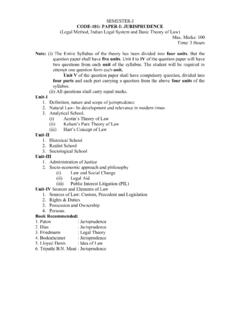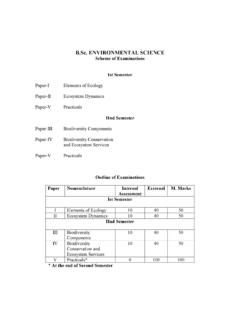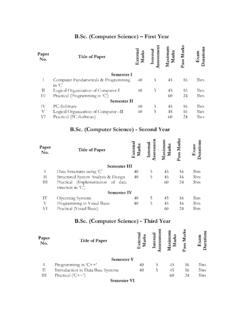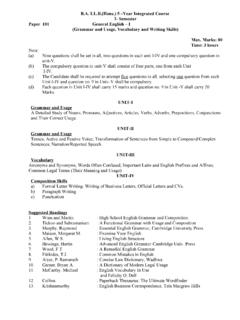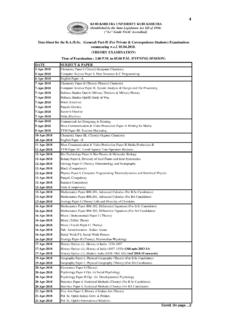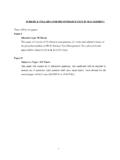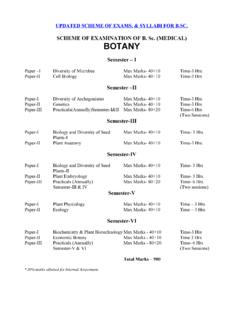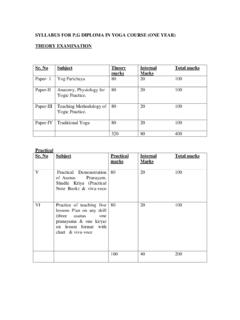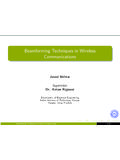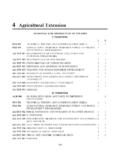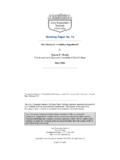Transcription of SYLLABUS OF M.A. (PREVIOUS) POLITICAL SCIENCE …
1 SYLLABUS OF (PREVIOUS) POLITICAL SCIENCE (SEMESTER SYSTEM) SCHEME OF EXAMINATIONS AND COURSES OF READING ( 2012-13) POLITICAL SCIENCE Course shall be a two years Degree Course of 2000 Marks consisting of four Semesters. The candidate shall take 5 Papers in each Semester, 20 Papers in the full Course. Each Paper will carry 100 marks out of which 20 marks shall be earmarked for Internal Assessment. (Previous) POLITICAL SCIENCE 1st & 2nd Semester: There shall be 4 Core Papers and 1 Optional Paper. The candidate will opt for 1 Optional Paper out of the given list of 3 Optional Papers. (Final) POLITICAL SCIENCE 3rd & 4th Semester: There shall be 2 Core Papers and 3 Optional Papers.
2 The Candidate will opt for 3 Papers from within the given 4 Groups of Papers. Note:- The Candidate opting for a particular Optional Paper/Group in the Odd Semester shall take the same Optional Paper/Group in the Even Semester. The choice of the Optional Papers in Course shall be determined on the basis of merit. However, the Department shall decide the number of Optional papers to be offered in the Department in a particular year. 2 Kurukshetra University, Kurukshetra (Previous), Semester-I POLITICAL SCIENCE Scheme of Examination 2012-13 Paper No. Nomenclature Time Paper:-I Western POLITICAL Thought 100 3 Hours Paper:-II Indian Government and Politics-I 100 3 Hours Paper:-III International Relations-Theory 100 3 Hours Paper:-IV Public Administration-I 100 3 Hours Paper-V One paper to be chosen from any of the following (the corresponding option has to be taken in Semester-II ) Option (i) Research Methodology-I 100 3 Hours Option (ii) POLITICAL Geography 100 3 Hours Option (iii) POLITICAL Leadership-Special Reference to Nation Building Process 100 3 Hours 3 SYLLABUS and Courses of Reading Paper: I Western POLITICAL Thought Max.
3 Marks: 100 Internal Marks :20 External Marks : 80 Time: 3 Hours Note: The question paper will consist of nine questions. The candidate shall attempt five questions in all. Question No. 1 will be compulsory. The compulsory question will consist of four short answer type conceptual/thematic questions of equal marks ( 4 marks each) spread over the whole SYLLABUS . The Candidate shall attempt four more questions selecting at least one from each Unit. Each question will carry 16 marks. Unit-I Plato, Aristotle, Machiavelli. Unit-II Hobbes, Locke, Rousseau. Unit-III Bentham, Mill. Unit-IV Hegel, Marx. Readings : 1. Sir E. Barker, The POLITICAL Thought of Plato and Aristotle, New York, Dover Publications, 1959.
4 2. Sir E. Barker, Greek POLITICAL Theory: Plato and His Predecessors, New Delhi, Publications, 1964. 3. Sir E. Barker, The Politics of Aristotle,(Translated with Introduction, Notes and Appendix), Oxford, Oxford University Press, 1995. 4. Berki, The History of POLITICAL Thought: A Short Introduction, London, Dent., 1977. 5. Burns (ed.), The Cambridge History of POLITICAL Thought, 1450-1700, Cambridge, Cambridge University Press, 1991. 6. H. Butterfield, The Statecraft of Machiavelli, New York, Collier, 1962. 7. A. Cobban, Rousseau and the Modern State, London, Unwin University Books, 1964. 8. J. Coleman, A History of POLITICAL Thought: From Ancient Greece to Early Christianity, London, Blackwell, 2000.
5 9. Davidson, POLITICAL Thought in England: The Utilitarians from Bentham, to Mill, Oxford, Oxford University Press, 1957. 10. Foster, Jones and Lancaster, Masters of POLITICAL Thought, 3 Vols., London, George G. Harrap and Co. Ltd., 1959. 11. Gettel, History of POLITICAL Thought, New York, Novell. & Co., 1924. 412. Hampsher-Monk, Modern POLITICAL Thought from Hobbes to Marx. Oxford, Basil Blackwell, 1992. 13. Laski, POLITICAL Thought from Locke to Bentham, Oxford, Oxford University Press, 1920. 14. S. Mukerjee and S. Ramaswamy, A History of POLITICAL Thought: Plato to Marx, New Delhi, Prentice Hall, 1999.
6 15. Sabine, History of POLITICAL Theory, 4th edn., Revised by Thorson, New Delhi, Oxford and IBH, 1973. 16. Shefali Jha, Western POLITICAL Though, Pearson, New Delhi, 2012. 17. Bhargava and Acharya, POLITICAL Theory: An Introduction, Pearson, New Delhi, 2012. 18. Bhargava and Acharya/Choubey, Rajniti Siddhant: Ek Parichay, Pearson, New Delhi, 2012. 19. Kymlicka/Choubey, Samkaleen Rajniti-Darshan: Ek Parichay, Pearson, New Delhi, 2012. 20. Abbas, POLITICAL Theory, Pearson, New Delhi, 2012. 5 Paper: II Indian Government and Politics-I Max. Marks: 100 Internal Marks :20 External Marks : 80 Time: 3 Hours Note: The question paper will consist of nine questions.
7 The candidate shall attempt five questions in all. Question No. 1 will be compulsory. The compulsory question will consist of four short answer type conceptual/thematic questions of equal marks ( 4 marks each) spread over the whole SYLLABUS . The Candidate shall attempt four more questions selecting at least one from each Unit. Each question will carry 16 marks. Unit-I Historical Background, Fundamental Rights & Duties, Directive Principles of State Policy, Constitutional Amendments. Unit-II Union and State Government- President, Prime Minister, Cabinet and Council of Ministers. State- Governor, Chief Minister. Union Parliament and State Vidhan Sabha.
8 Local Government- Rural and Urban. Unit-III Judiciary- Supreme Court and the High Courts. Judicial Review, Judicial Activism including Public Interest Litigation Cases, Judicial Reforms. Unit-IV Indian Federalism- Theory and Practice. Demands for State Autonomy and Separatist Movements. POLITICAL and Social Dimensions- POLITICAL Elites, Civil Society and Secularism. Readings: 1. G. Austin, The Indian Constitution: Corner Stone of a Nation, Oxford, Oxford University Press, 1966. 2. P. Bardhan, The POLITICAL Economy of Development in India, London, Oxford, Blackwell, 1984. 3. , An Introduction to the Constitution of India, New Delhi, Prentice Hall, 1994.
9 4. Bhambri, The Indian State: Fifty Years, New Delhi, Shipra, 1999. 5. Bombwall, The Foundations of Indian Federalism, Bombay, Asia Publishing House, 1967. 6. Brass, Politics of India Since Independence, 2nd edn., Cambridge, Cambridge University Press, 1994. 67. N. Chandhoke, Beyond Secularism: The Rights of Religious Minorities, Delhi, Oxford University Press, 1999. 8. Fadia, State Politics in India, 2 Vols., New Delhi, Radiant, 1984. 9. , Democratic Concerns: The Indian Experience, Jaipur, Alekh, 1994. 10. , Politics in India, Delhi, Oxford University Press, 1998. 11. (ed.), India s Democracy: An Analysis of Changing State-Society Relations, Princeton NJ, Princeton University Press, 1988.
10 12. , (ed), The Success of India s Democracy, Cambridge, Cambridge University Press, 2001. 13. , Caste and Politics in India, New Delhi, Orient Longman, 1970. 14. R. Kothari, Politics in India, New Delhi, Orient Longman, 1970. 15. Morris Jones, Government and Politics in India, Delhi, BI Publications, 1974. 16 Pylee, An Introduction to the Constitution of India, New Delhi, Vikas, 1998. 17. Abbas, Indian Government and Politics, Pearson, New Delhi, 2012. 18. Neera Chandoke, Contemporary India, Pearson, New Delhi, 2012. 19. Pravin Kumar Jha, Indian Politics in Comparative Perspective, Pearson, New Delhi, 2012. 20. Pravin Kumar Jha, Tulnatamak Paripekchay Mein Bhartiya Rajniti, Pearson, New Delhi, 2012.
